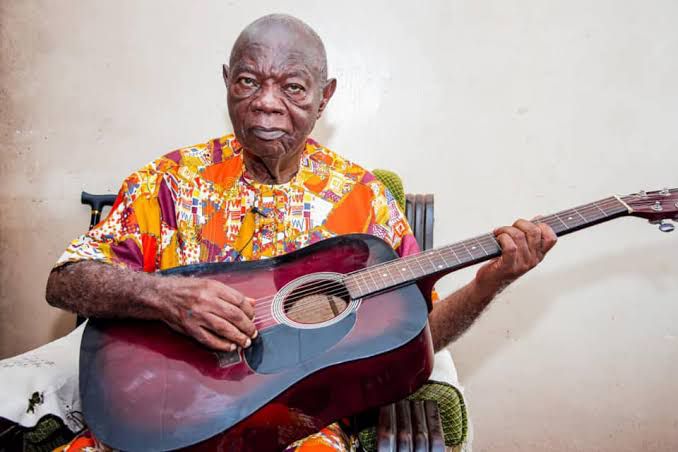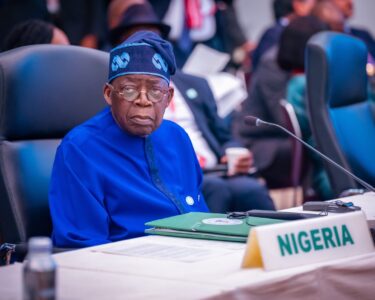Mike Ejeagha
Renowned highlife legend dies at 95
Summary
- Mike Ejeagha, a celebrated Nigerian highlife musician and folklorist, passed away on June 6, 2025, at 95, after a prolonged battle with prostate cancer
- Known for hits like “Gwo gwo gwo ngwo,” Ejeagha’s music preserved Igbo culture through storytelling, earning him widespread admiration across generations
- Prominent figures, including President Bola Tinubu and Governor Peter Mbah, mourned his death, highlighting his monumental contributions to Nigeria’s cultural heritage
Enugu, Nigeria – The Nigerian music scene and cultural landscape were plunged into mourning with the passing of legendary highlife musician, songwriter, folklorist, and cultural custodian, Mike Ejeagha, fondly known as “Gentleman Mike,” on Friday, June 6, 2025.
Ejeagha died at the age of 95 at the 32 Garrison Hospital in Enugu, Nigeria, following a nearly two-decade battle with prostate cancer, as confirmed by his eldest son, Emma Ejeagha.
Born on April 4, 1930, in Imezi Owa, Ezeagu Local Government Area of Enugu State, Ejeagha rose to prominence in the 1960s and 1980s as a pioneer of Nigerian highlife music. His unique style, blending Igbo folklore, proverbs, and moral lessons into captivating melodies, made him a household name.
Mike’s iconic song “Gwo gwo gwo ngwo,” which narrates the tale of a cunning tortoise outsmarting an elephant, gained renewed popularity in recent years, thanks to its use in a viral dance challenge promoted by skit maker Brain Jotter.
Ejeagha’s career spanned over six decades, during which he produced over 300 recordings, now archived in the National Archives of Nigeria. His work not only entertained but also served as a vessel for preserving and promoting Igbo culture and oral traditions.
He gained national recognition in the 1970s as a guest presenter on the Nigerian Television Authority’s cultural program Akuko N’Egwu (Stories in Music), where his storytelling prowess and rhythmic melodies resonated with audiences. Cultural commentators have hailed him as one of the last true oral historians of his generation.
Tributes poured in from across Nigeria, reflecting Ejeagha’s far-reaching influence. President Bola Tinubu described him as “one of Nigeria’s greatest folklorists, songwriters, and musicians in the Igbo language,” noting that his music inspired generations and preserved Igbo customs.
Tinubu also commended the Enugu State government for honoring Ejeagha during his lifetime by renaming Obinagu Road as Chief Mike Ejeagha Road.
Enugu State Governor Peter Mbah expressed profound grief, calling Ejeagha’s death a “devastating cultural loss” and a “void that would be difficult to fill.” Mbah, who had celebrated the musician by reconstructing roads leading to his residence, assured that the state would further immortalize the legend.
“His humility and far-reaching influence transcended boundaries,” Mbah said, emphasizing Ejeagha’s role as a cultural ambassador.
Other notable figures, including the 2023 Labour Party presidential candidate Peter Obi, paid heartfelt tributes. Obi remarked, “His transition marks the end of an era, but not the end of his voice – his songs will continue to echo through generations as testaments to wisdom, culture, and truth.”
Similarly, Atiku Abubakar, the 2023 People’s Democratic Party presidential candidate, celebrated Ejeagha’s legacy, noting the resurgence of “Gwo gwo gwo ngwo” as a cultural milestone.
The Minister of Art, Culture, Tourism, and Creative Economy, Hannatu Musa Musawa, also mourned Ejeagha, highlighting his “undeniable impact” on Igbo culture and his extensive discography as a testament to his dedication.
Ejeagha’s death marks the end of a significant chapter in Nigerian highlife music, but his legacy endures through his timeless songs and the cultural wisdom they carry. He is survived by his wife, children, and grandchildren, with funeral arrangements expected to be announced soon.







